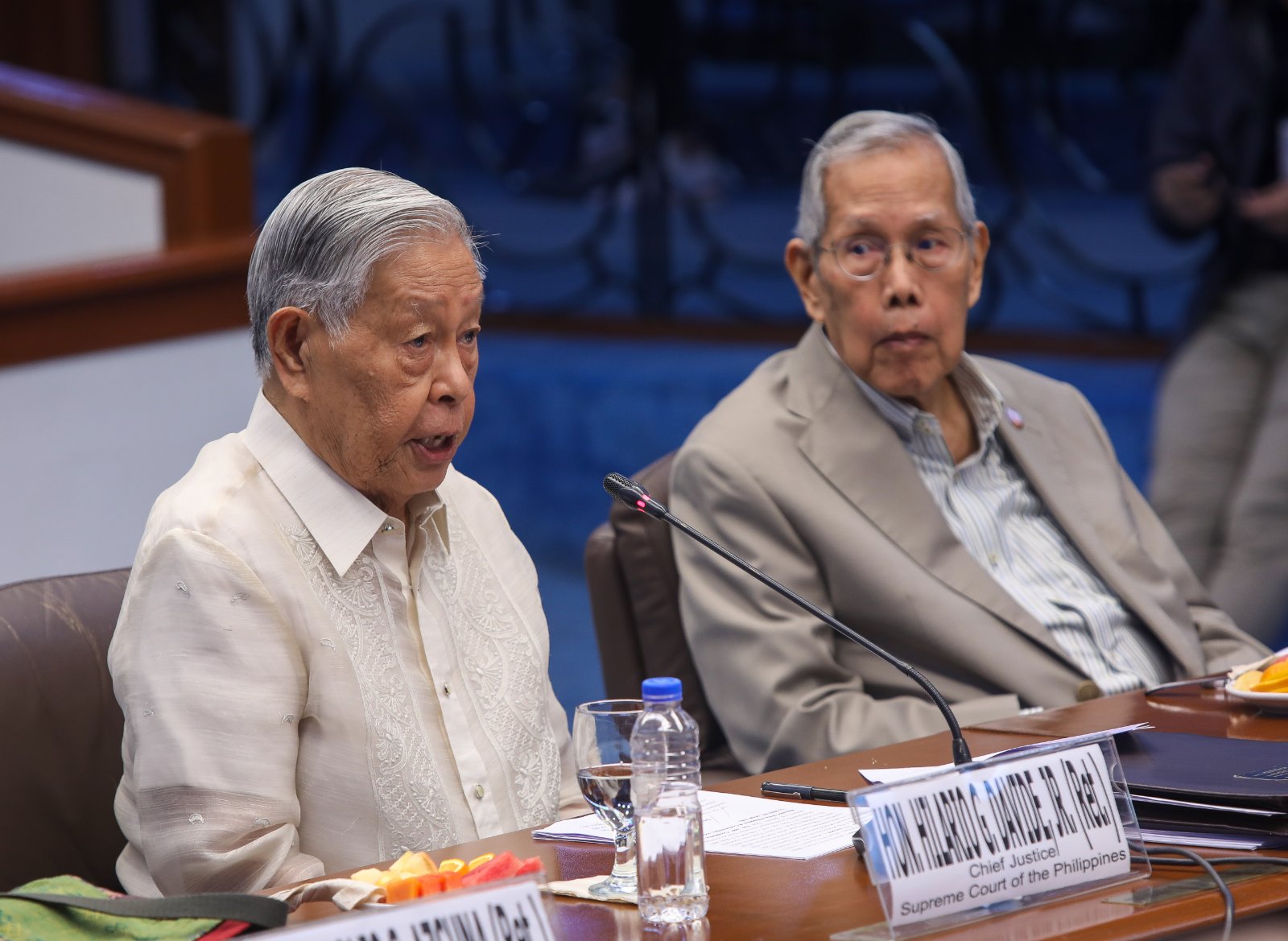Voting jointly or separately? Constitution, legal experts weigh in on Senate, House impasse on Cha-cha mode
Should the Senate and House of Representative vote separately when amending the economic provisions of the 1987 Constitution?

Former Chief Justice Hilario Davide Jr. (left) and former Chief Justice Vicente Mendoza appear at the Senate Subcommittee on Constitutional Amendments and Revision of Codes' initial hearing on Resolution of Both Houses No. 6. The resolution proposes amendments to certain economic provisions in the 1987 Constitution. (Senate PRIB Photo)
For former Supreme Court Justice Vicente Mendoza, “yes,” because that is what was really decided by the Constitutional commission that framed the 1987 Constitution.
“And it was only by reason of oversight that the corresponding phrase was not placed there. But the other provisions of the Constitution were amended. Oversight lamang. Oversight,” Mendoza explained in response to Deputy Minority Leader Risa Hontiveros’ query during the Senate subcommittee’s hearing on Resolution of Both Houses No. 6.
When asked if the oversight committed was the omission of the phrase “in joint session assembled,” Mendoza nodded in the affirmative.
“In joint session assembled,” Mendoza said. “Yes, because we speak only of separate voting if they're in joint session,” he further explained.
“Because if they're not in joint session, there’s no sense in saying, ‘voting separately.’ Kasi talagang magkahiwalay (They really are separate). But precisely because the intention is to compel the two houses to come together and assemble so that the enacting clause will say, ‘Be it enacted by the Senate and the House in joint session assembled by the vote of three fourths voting separately, hereby propose’,” the former justice said.
Mendoza further explained that what is required is for the two houses to deliberate on pertinent issues separately.
“Right after the war, we had a government, the Congress with two houses. When the problem of parity rights came up and that required constitutional amendment, the two houses met together at nakalagay doon sa (and it was indicated in the) certification of the secretaries, that the two houses met together,” he pointed out.
“Where? In Lepanto, Sampaloc, where Congress was holding sessions. So that illustrates the application of that provision,” he insisted.
Mendoza also pointed out that despite the debate regarding the silence of the Constitution on this matter, he stressed the benefit of having the two houses coming together but voting separately.
“They can exchange views regardless of their status as senators or congressmen. The Constitution contemplates the same. They are not senators or congressmen. They are members of a constituent assembly (Con-ass), isang body lamang,” he said.
“So the benefit of exchange is there, which you cannot have if you leave this policymaking to Congress by law. Because one house will be acting here, the other house will be acting over in Quezon City. You will not have the benefit of exchange of views,” he insisted.
Mendoza further explained the necessity of voting separately because the Senate represents the national interests, while on the other hand, the House represents the local interests.
“I agree, Senator. Because you represent two different interests. The national interests. Because national interest is represented by the Senate, the local interest is represented by the House. That's the essence of bicameralism,” Mendoza pointed out.
Former SC chief Justice Hilario Davide, Jr. for his part, insisted on his previous stand on the issue, believing there are two ways for Congress to propose amendments.
“One, in joint session, voting separately or in ordinary legislation with one body proposing a proposal for amendment to a Constitution and approving the same by three-fourths votes,” Davide said.
“And then that should be submitted to the Lower House or to the Upper House as the case may be, voting also by three-fourths vote. And then plebiscite already,” Davide said.
However, Davide says he sees no valid reason to amend the 1987 Constitution saying doing so would bring more serious and disturbing problems to the country.
“Our problems are not due to the restrictive economic provisions of the Constitution. They cannot be solved by removing these restrictive economic provisions and completely leaving to Congress the future under the clause ‘unless otherwise provided by law’,” Davide said.
Meanwhile former SC Justice Adolfo Azcuna believes it is best left for the Supreme Court to decide whether or not the House and the Senate should be voting separately.
“Ultimately, it will have to be the Supreme Court that will decide what is the manner in which this three-fourths vote by Congress will be achieved,” he said.
“So it is good, I believe, that the Senate is now going through the process of adopting a proposed amendment by way of resolution of the Senate and the House voting separately and meeting separately and submitting that later to the Supreme Court, to be decided whether that is a proper manner of proposing amendments to the Constitution,” Azcuna said.
“Ultimately, we have to have this resolved by the Supreme Court. I think Justice Suarez, in leaving the ambiguity without changing the wording, wanted it to be determined by the Supreme Court,” he pointed out to the senators.